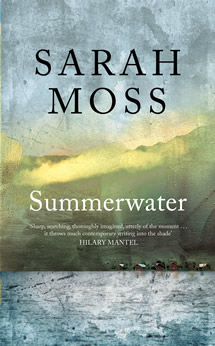Reviewed by Robert Goodman.
By Sarah Moss, Picador, $32.99.
 Sarah Moss is one of the foremost chroniclers of the state of modern Britain. Her previous book Ghost Wall used a Neolithic archaeological dig to explore issues of belonging, toxic masculinity and the impact of Brexit. In Summerwater, Moss doubles down on these themes. Set over a single, rainy day at a Scottish holiday camp, she uses its inhabitants to run through a broader cross section of British society.
Sarah Moss is one of the foremost chroniclers of the state of modern Britain. Her previous book Ghost Wall used a Neolithic archaeological dig to explore issues of belonging, toxic masculinity and the impact of Brexit. In Summerwater, Moss doubles down on these themes. Set over a single, rainy day at a Scottish holiday camp, she uses its inhabitants to run through a broader cross section of British society.
Summerwater opens on a bleak Scottish landscape:
Dawn. There’s no sunrise, no birdsong…
Although there’s no distance between cloud and land, nowhere for the rain to fall, it is raining; the sounds of water on leaves and bark, on roofs and stones, windows and cars, become as constant as the sounds of blood and air in your own body.
This rain is falling a group of wooden cabins set on the edge of a Scottish loch. There is no phone connection or wifi except at the pub down the road and there is a local ferry to take residents to a café on the other side. In each cabin is a family who Moss will variously drop in on throughout the day. Each are at a different stage of life – the young soon to be married couple, a couple with two very young children, a couple with primary schoolers, a couple with older teenagers and then a couple of retirees. All of the residents are watching all of the other residents. They rarely interact but they all have theories and preconceptions about the others. And then there is the cabin that the author does not visit. A Ukranian mother and daughter who most have fairly racist and nationalist theories about.
Through this series of short stories, many stream of consciousness style, each character emerges as unique and individual. And each shines a different light attitudes of modern Britain. But Moss also manages to capture a range of universal experiences of holidays that do not live up to their promise, of youthful daring, of managing life with small children, of growing old and starting to lose words and memories. At the same time, through a series of short vignettes, Moss counterpoints these experiences with the natural world of the loch, of a struggle that has been occurring and will continue irrespective of transient visitors.
Summerwater is poetic, affecting and timely. Moss is both clear eyed and compassionate. She lets her characters expose themselves, their beliefs and their foibles. But as with Ghost Wall, she is clearly not a fan of Brexit and the nationalist attitudes that it has fostered. In Summerwater, through her younger characters, she shows how those attitudes might metastasize dangerously through into the next generation, building the whole enterprise to a shocking but not wholly unexpected conclusion.










